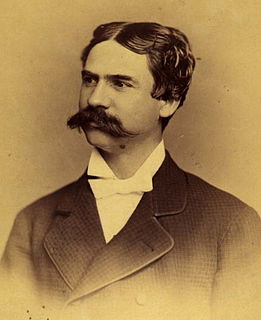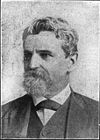
The United States presidential election of 1876 was the 23rd quadrennial presidential election, held on Tuesday, November 7, 1876. It was one of the most contentious and controversial presidential elections in American history, and is known for being the catalyst for the end of Reconstruction. Republican nominee Rutherford B. Hayes faced Democrat Samuel J. Tilden. After a controversial post-election process, Hayes was declared the winner.

Samuel Jones Tilden was the 25th Governor of New York and the Democratic candidate for president in the disputed election of 1876. He was the only individual to win an outright majority of the popular vote in a United States presidential election but lose the election itself, though four other candidates have lost a presidential election despite garnering a plurality of the popular vote.

The Electoral Commission was a temporary body created on January 29, 1877 by the United States Congress to resolve the disputed United States presidential election of 1876. Democrat Samuel J. Tilden and Republican Rutherford B. Hayes were the main contenders in the election. Tilden won 184 electoral votes—one vote shy of the 185 needed to win—to Hayes's 165, with 20 electoral votes from four states unresolved. Both Tilden and Hayes electors submitted votes from these states; and each claimed victory over the other.

John Leigh "Jay" Dardenne, Jr. is a lawyer and politician from Baton Rouge, Louisiana, who is currently serving as commissioner of administration for Democratic Governor John Bel Edwards. A moderate Republican, Dardenne served as the 53rd lieutenant governor of his state from 2010 to 2016. Running as a Republican, he won a special election for lieutenant governor held in conjunction with the regular November 2, 2010 general election. At the time, Dardenne was Louisiana secretary of state. Formerly, Dardenne was a member of the Louisiana State Senate for the Baton Rouge suburbs, a position he filled from 1992 until his election as secretary of state on September 30, 2006.
Paul Jude Hardy is an American attorney from Baton Rouge, in the U.S. state of Louisiana, who was the first Republican to have been elected lieutenant governor of the U.S. state of Louisiana since Reconstruction. He served in the second-ranking post under Governor Buddy Roemer from 1988 to 1992.

Henry Clay Warmoth was an American attorney, Civil War officer in the Union Army, who was elected governor and state representative of Louisiana. A Republican, he was 26 years old when elected as 23rd Governor of Louisiana, one of the youngest governors elected in United States history. He served during the early Reconstruction Era, from 1868 to 1872.
Henry Martyn Spofford, born in Gilmanton, New Hampshire, was a judge of the Louisiana Supreme Court. He graduated from Amherst College and relocated to Louisiana, in 1845, where he practiced law. Spofford was elected to the Louisiana Supreme Court and served until 1858, when he resigned to return to his law practice.
The Louisiana Democratic Party is the affiliate of the national Democratic Party of the United States in the state of Louisiana.

Stephen Bennett Packard, a native of Maine, emerged as an important Republican politician in Louisiana during the era of Reconstruction. He was the unsuccessful Republican gubernatorial nominee in 1876.

The Republican Party of Louisiana is the U.S. state of Louisiana's organization of the national Republican Party. The state chairman is Louis Gurvich, a businessman from New Orleans, who was elected on February 24, 2018. Since the late 20th century, white conservatives in the states have mostly shifted to the Republican Party from the Democratic Party. As of 2016, every statewide elected official in Louisiana, with the exception of the governor, is a Republican.
The following table indicates the party of elected officials in the U.S. state of Louisiana:

The Battle of Liberty Place, or Battle of Canal Street, was an attempted insurrection by the Crescent City White League against the Reconstruction Era Louisiana state government on September 14, 1874, in New Orleans, which was the capital of Louisiana at the time. Five thousand members of the White League, a paramilitary organization of the Democratic Party, made up largely of Confederate veterans, fought against the outnumbered New Orleans Metropolitan Police and state militia. The insurgents held the statehouse, armory, and downtown for three days, retreating before arrival of Federal troops that restored the elected government. No insurgents were charged in the action. This was the last major event of violence stemming from the disputed 1872 gubernatorial election, after which Democrat John McEnery and Republican William Pitt Kellogg both claimed victory.

The 1876 United States elections were held on November 7. In one of the most disputed presidential elections in American history, Republican Governor Rutherford B. Hayes of Ohio ended up winning despite Democratic Governor Samuel J. Tilden of New York earning a majority of the popular vote. The Republicans maintained their Senate majority and cut into the Democratic majority in the House.

The 2012 United States presidential election in Louisiana took place on November 6, 2012, as part of the 2012 General Election in which all 50 states plus The District of Columbia participated. Louisiana voters chose eight electors to represent them in the Electoral College via a popular vote pitting incumbent Democratic President Barack Obama and his running mate, Vice President Joe Biden, against Republican challenger and former Massachusetts Governor Mitt Romney and his running mate, Congressman Paul Ryan.

Jean Maximilien Alcibiades Derneville DeBlanc was a lawyer and state legislator in Louisiana. He served as a colonel for the Confederate army during the American Civil War. Afterward, he founded the Knights of the White Camellia, a white insurgent militia that operated from 1867-69 to suppress freedmen's voting, disrupt Republican Party political organizing and try to regain political control of the state government in the 1868 election. A Congressional investigation overturned 1868 election results in Louisiana.

The Louisiana gubernatorial election, 1888, was the second election to take place under the Louisiana Constitution of 1879. As a result of this election Francis T. Nicholls was re-elected Governor of Louisiana. The election saw widespread intimidation of African-Americans which guaranteed the election of the Democratic nominee.
Francis C. Heitmeier is a lobbyist and former manager of a telephone company from his native New Orleans, Louisiana, who is a Democratic former member of the Louisiana State Senate for District 7 in Orleans, Jefferson, and Plaquemines parishes. First elected in 1991, he was term-limited and ineligible to seek a fifth term in the nonpartisan blanket primary held on October 20, 2007.

The 1876 U.S. presidential election occurred at the twilight of Reconstruction and was between Republican Rutherford B. Hayes and Democrat Samuel J. Tilden. After an extremely heated election dispute, a compromise was eventually reached where Hayes would become U.S. President in exchange for the end of Reconstruction and a withdrawal of U.S. federal troops from the South.

The 1876 United States presidential election in Florida took place on November 7, 1876, as part of the 1876 United States presidential election. Florida voters chose four representatives, or electors, to the Electoral College, who voted for president and vice president.

















